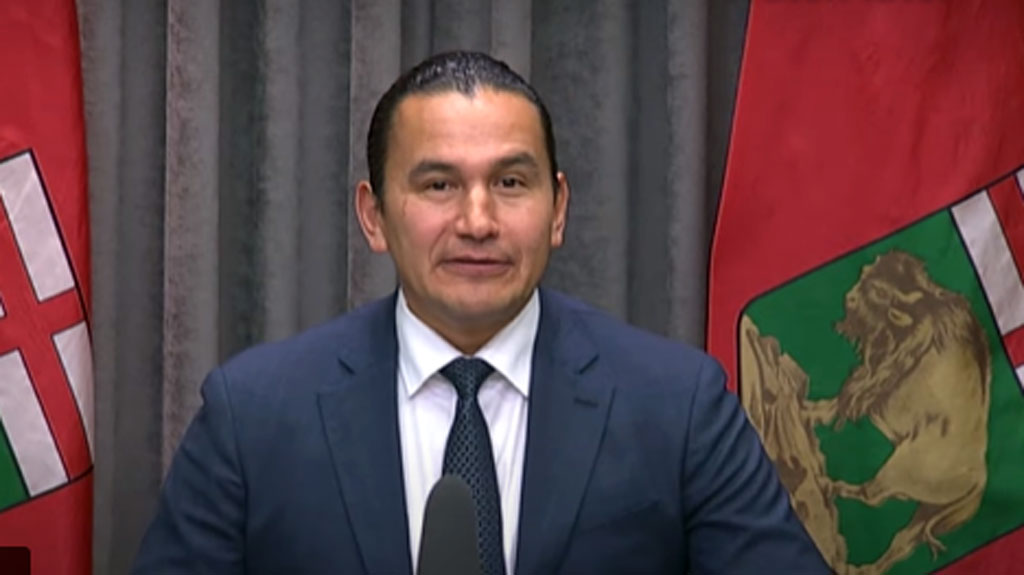The recent Manitoba speech from the throne laid out Premier Wab Kinew’s vision for what he wants to accomplish in the keystone province.
The government’s program combines a commitment to invest in health care and other public services with a promise that spending won’t get out of hand.
The newly-elected NDP government is more to the left than the previous Progressive Conservative administration, but so far it appears to be aiming at a spot near the centre of the province’s political spectrum.
“Manitobans elected our government to bring people together to solve the
challenges we face as a province, from record wait times for health care, to rising costs for families and a homelessness crisis that is visible across the province,” the speech reads.
Kinew said the government is taking steps to address challenges in health care.
“We are opening ten additional surgical slates for surgery at the Grace Hospital (Winnipeg) and expanding spinal surgical capacity at the Health Sciences Centre (Winnipeg), Concordia Hospital (Winnipeg) and the Brandon Regional Health Centre.”
In the throne speech Kinew repeated a phrase he often used during the election campaign: The economic horse pulls the social cart.
“In order for us to deliver on our mandate to fix health care and lower costs for families, we have to grow the economy and ensure the conditions are right for the private sector to succeed.”
The throne speech also sounded a note of caution.
“Many commitments the previous government made did not fit with a sustainable approach to the province’s finances. These decisions have left Manitoba in a financial challenge.
“This does not deter us from fulfilling our mandate to balance the budget at the end of this term in office, but it will require that we act responsibly and stabilize the province’s finances.”
Following the speech, the Journal of Commerce spoke to several people in Manitoba construction and business to get their reactions.
Bram Strain, president and CEO of the Business Council of Manitoba, said he’s pleased with the speech.
“There were no surprises,” said Strain. “It stayed true to election promises and to the cabinet ministers’ mandate letters.”
He said the speech was full of specifics and it showed the direction in which the government wants to go.
“It articulated some aspirational goals with respect to the climate and sustainability, and also practical goals for housing and health care,” said Strain.
Chris Lorenc, president of the Manitoba Heavy Construction Association, said MHCA heard confirmation of Kinew’s commitment to growing Manitoba’s economy.
“Throughout our recent meetings with Premier Kinew and cabinet ministers, we’ve heard the new government intends to maintain the course with the $500-million-plus highways capital budget and the five-year infrastructure capital plan,” said Lorenc. “That’s encouraging not just for our industry, but for the future growth and prosperity of Manitoba.”
Kevin Rebeck, president of the Manitoba Federation of Labour, said the MFL is “encouraged by the new tone of respect for working people.”
“Inflation has hit working families hard over the last few years and the MFL is glad the government is committed to re-balancing Manitoba’s labour relations, after the previous government tipped the scales in favour of employers.”
Rebeck said because the economy could start to slow down, “now is the time for government to make strategic investments to keep our economy strong and help families pay their bills.”
Tanya Palson, executive director of Manitoba Building Trades, said she is happy to see the government commit to keeping construction jobs in Manitoba and not having them go to workers from other provinces.
“We’ll be looking for more detail in the future about investment in programs for apprenticeships and workforce development,” said Palson. “We want to see a government agenda that is fiscally reasonable and that also has maximum impact on local workers.”
Darryl Harrison, Winnipeg Construction Association’s director of stakeholder engagement, said there was nothing in the throne speech about apprenticeship ratios.
“During the election campaign, the NDP proposed changing the ratio of apprentices to journeypersons from 2:1 to 1:1, which could reduce the number of workers in construction,” said Harrison. “And we didn’t see anything about an energy strategy, either. Manitoba has enough energy now, but the our supply won’t be adequate forever and we should start planning now.”
Christopher Adams, adjunct professor of political studies at the University of Manitoba, said the throne speech marks the opening of the new legislative session.
“The promises made during the election campaign are articulated in the throne speech, which provides a window into the priorities of the government.”











Recent Comments
comments for this post are closed